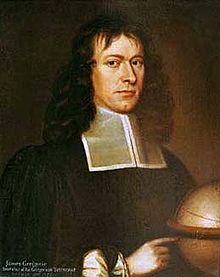James Gregory (astronomer and mathematician)
| James Gregory | |
|---|---|

James Gregory (1638–1675)
|
|
| Born | November 1638 Drumoak, Aberdeenshire, Scotland |
| Died | October 1675 (aged 36) Edinburgh, Scotland |
| Residence | Scotland, England, Venice |
| Citizenship | Scotland |
| Nationality | Scottish |
| Fields |
Mathematics Astronomy |
| Institutions |
University of St. Andrews University of Edinburgh |
| Alma mater |
Marischal College (University of Aberdeen) University of Padua |
| Known for | Gregorian telescope, diffraction grating, fundamental theorem of the calculus, Gregory's transformation,Gregory coefficients |
| Influences | Stefano degli Angeli |
| Influenced | David Gregory |
| Notes | |
|
Nephew of Alexander Anderson. Uncle of David Gregory.
|
|
James Gregory (also spelled James Gregorie) FRS (November 1638 – October 1675) was a Scottish mathematician and astronomer. He described an early practical design for the reflecting telescope – the Gregorian telescope – and made advances in trigonometry, discovering infinite series representations for several trigonometric functions.
In his book Geometriae Pars Universalis (1668) Gregory gave both the first published statement and proof of the fundamental theorem of the calculus (stated from a geometric point of view, and only for a special class of the curves considered by later versions of the theorem), for which he was acknowledged by Isaac Barrow.
The youngest of the 3 children of John Gregory, an Episcopalian Church of Scotland minister, James was born in the manse at Drumoak, Aberdeenshire, and was initially educated at home by his mother, Janet Anderson (~1600–1668). It was his mother who endowed Gregory with his appetite for geometry, her uncle – Alexander Anderson (1582–1619) – having been a pupil and editor of French mathematician Viète. After his father's death in 1651 his elder brother David took over responsibility for his education. He attended Aberdeen Grammar School, and then Marischal College from 1653–1657, graduating AM in 1657.
In 1663 he went to London, meeting John Collins and fellow Scot Robert Moray, one of the founders of the Royal Society. In 1664 he departed for the University of Padua, in the Venetian Republic, passing through Flanders, Paris and Rome on his way. At Padua he lived in the house of his countryman James Caddenhead, the professor of philosophy, and he was taught by Stefano Angeli.
...
Wikipedia
